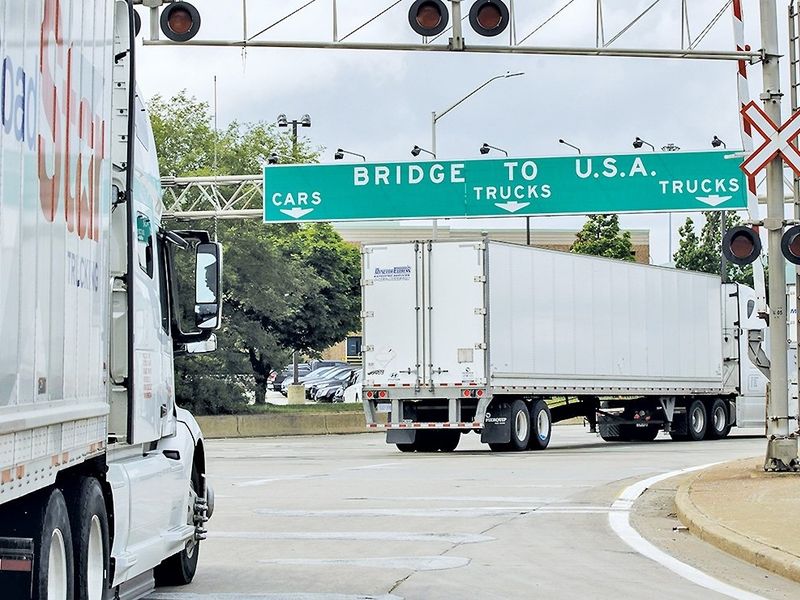
After a near two-year border shutdown, Canadian auto suppliers are looking to rebuild ties with customers south of the border in time for an expected surge in demand for new vehicles.
Export Development Canada (EDC) predicts a 27-per-cent jump in vehicle and parts exports in 2022, erasing declines from the twin shocks of the COVID-19 pandemic and the ongoing global parts shortages.
Only supply chain bottlenecks are standing in the way of more vehicle sales to consumers flush with cash that they couldn’t spend in the past two years, said Peter Hall, the Crown corporation’s chief economist.
“We believe there is ultimately enough supply in the system, whether it’s raw materials, intermediate goods, computer chips or what have you,” Hall said. “But generally, things are in the wrong places.”
U.S. crossings reopened to Canadians on Nov. 8, two months after Canada began welcoming vaccinated Americans. While the bottlenecks are expected to ease, there’s less confidence that Canadian suppliers can pick up where they left off with U.S. customers when COVID-19 forced the unprecedented land border closure in March 2020.
It’s an unknown that weighs on Jeanine Lassaline-Berglund, president of the Canadian Association of Moldmakers (CAMM). “Have we eroded relationships enough that American companies are going to think twice about doing business with Canadian companies?”
NOT BUSINESS AS USUAL
Goods and people designated as essential workers still crossed between Canada and the United States through the long closure. But delays, confusion and onerous COVID-19 testing requirements exacted a big price, suppliers say.
In a June 2021 survey led by the Canadian Tooling and Machining Association, 87 per cent of companies reported quarantine orders for employees and visitors and denial of entry to visitors into Canada, and 69 per cent said they had lost contracts because of border problems.
Among respondents willing to disclose financial details, 65.4 per cent estimated that the 2021 impact could range from $100,000 to more than $5 million.
“It highlights that Canada is another country,” said Scott Allen, COO of Integrity Tool and Mold in Oldcastle, Ont., near Windsor. “Just as much as people who have cottages on the other side of the border are thinking twice about it … do I want to deal with this?”
Integrity, with more than $200 million in yearly revenue and satellite plants in Tennessee and Mexico, has not suffered “overwhelming” losses from border problems, Allen said. “Right now, automotive and tooling is pretty busy, and there’s a lot of demand, so we’re fortunate,” he said. “If it wasn’t that case, like it was two years ago, I think we would be in big trouble.”
The industry welcomed the federal government’s recent decision to end the requirement for proof of a negative COVID-19 test for fully vaccinated Canadians taking short trips. But the government reversed course and reinstituted the practice in an effort to tamp down the spread of the contagious Omicron variant. Americans entering Canada still need a test, too.
TESTING TESTS PATIENCE
Business groups and politicians on both sides of the border have said the molecular test, which can cost $200 or more, is unnecessary for vaccinated travelers and discourages travel.
“I personally have spent over $2,000 for tests,” Allen said.
“It’s to the point of ridiculous,” said Lassaline-Berglund, whose moldmaker group published an online guide to help members navigate changing border rules.
Free movement is vital as companies work to rebuild ties with customers and suppliers through plant demonstrations and other activities that can’t be done online, she said.
“I’m broad-brush-stroking here, but Americans do not have a reputation for being patient when it comes to relationships,” Lassaline-Berglund said.
Export Development’s Hall, however, said border troubles weren’t even mentioned in online meetings he held recently with manufacturers across the country. For the auto sector, the shortage of microchips was the No. 1 concern.
“What we are getting from the industry itself as we talk to our customers is, ‘Look, there is no problem with us being able to actually deliver product,’ ” Hall said. “The problem is being able to complete the product. The chips are what are standing in the way of that.’”
For industry consultant Laurie Harbour, border constraints are just part of a “myriad of problems” facing suppliers. “Every day within a manufacturing plant, you’ve got nothing but sheer chaos,” said Harbour, president of Harbour Results Inc., a Michigan-based supplier consultancy. “Trying to figure out: ‘OK, can I ship this across the border? OK, do I have resin to make moulded parts, do I have steel?’ ”
Harbour, like the EDC, is bullish about the prospects for companies that can remain flexible and cash in on soaring demand for cars and other durable goods. But success for the industry also hinges on the easy movement of people and products between the two nations.
“The border is a big deal,” Harbour said. “The Canadian and U.S. relationship is critical to manufacturing, and we’ve got to continue to foster that.”